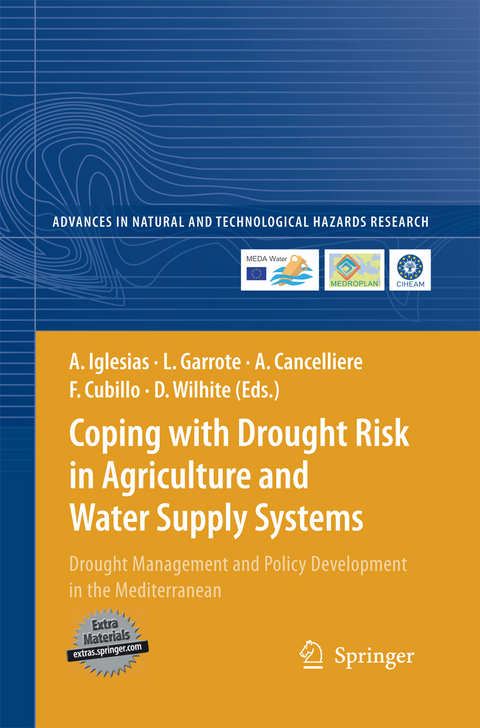
Coping with Drought Risk in Agriculture and Water Supply Systems
Springer (Verlag)
978-94-007-8952-4 (ISBN)
The book comprises a collection of papers divided into four sections that appeal to a broad audience. First, the social and hydrological context of Mediterranean countries is presented, discussing the interactions that have resulted in the complex institutional framework, and highlighting the importance of stakeholder involvement and awareness building for successful drought management. This section emphasises the role of organizations, institutions, and civil stakeholders involved in drought preparedness and mitigation and/or on water management for designing effective risk based strategies that mitigate the effects of drought in agriculture and water supply systems.
Second, the book presents an academic approach to risk evaluation, including characterization of drought episodes, development of indicators of risk in hydrological and agricultural systems, and analysis of the role of economic instruments and groundwater for risk mitigation. This section finalises with the description of an integrated method for evaluating social vulnerability based on indicators that include the capacity to anticipate, cope, and respond to drought.
The third section includes a collection of case studies that include the description of effective measures taken in the past. These case studies provide the context for developing demand driven guidelines that may be applied to other regions. The authors of these chapters can be viewed as stakeholders in drought management, since they represent a broad range of sectors and institutions from Mediterranean European and North African countries. The topics addressed have implications for the international policy community interested in disaster mitigation, agricultural policy, and development.
Finally a synthesis of the management actions is presented in four chapters. Monitoring and preparedness planning is the essential first step for moving from disaster to risk management in response to drought. The management actions related to agriculture and water supply systems are presented in two different chapters but with a common conceptual framework based on the use of drought indicators for evaluating the levels of drought risk (pre-alert, alert, and emergency), that allow establishing linkages between science and policy. The final chapter discuses the lessons learned and application to other regions.
Dr. Ana Iglesias is a Research Scientist at the Universidad Politecnica de Madrid in Spain and previously in the Goddard Institute for Space Studies at Columbia University in New York. Her research focuses in understanding the interactions of global change with agriculture and water resources. Scientific advances include national and regional evaluations of adaptation strategies, focusing in the risk of vulnerable populations. She has contributed to programs of the U.N. Environmental Programme, UNESCO, U.S. Agency for International Development, and U.S. Environmental Protection Agency. She leads the development of Drought Management Guidelines within the MEDA program of the European Union. Prof. Luis Garrote is a Professor of Civil Engineering: Hydraulics and Energetics at the Universidad Politecnica de Madrid in Spain and received formal training at the Massachusetts Institute of Technology, USA. His academic and scientific contributions to planning and management of hydrological systems include development of hydrological models, flood forecasting, reservoir management, and intelligent decision support systems. His distinguished professional record in the integrated water resources management includes collaborations with National and International Administrations. He has developed widely applied projects financed by the programs of research and development of private companies, the Ministry of Education, Science and Technology, and the European Union. Prof. Donald Wilhite. The ongoing challenge of Dr. Wilhite’s work is convincing policy makers of the advantages of drought preparedness plans and mitigation actions and programs, in contrast to the more typical crisis management approach. Policy makers often do not understand drought climatology, and scientists have trouble providing probability-based information in a format that non-scientists can comprehend. Risk-based drought management can eliminate or reduce many of the impacts associatedwith drought-induced water shortages. Governments at all levels should take a multidisciplinary, interagency approach to drought planning as pressure on water and other natural resources increases as a result of increasing and shifting population and many other factors. Dr. Wilhite directs the National Drought Mitigation Center and the International Drought Information Center. He is a professor in the School of Natural Resources at the University of Nebraska–Lincoln, where he has been on the faculty since 1977. His research centers on drought management and preparedness, the policy implications of climate variability and climate change, and the effects of climate on society. In conjunction with this research, he has conducted training seminars and workshops in developing and developed countries to help governments create drought plans.
Challenges to Drought Management in Mediterranean Countries.- Drought Monitoring as a Component of Drought Preparedness Planning.- Soft Law Principles for Improving Drought Management in Mediterranean Countries.- A Checklist for Drought Policy Development.- An Environmental Focus on Drought: The Water Framework Directive.- Guidelines to Develop Drought Management Plans.- Methods and Approaches for Drought Management.- Drought Characterisation in the Mediterranean.- A Paradigm for Applying Risk and Hazard Concepts in Proactive Planning.- Assessment of Drought Risk in Water Supply Systems.- Mathematical Models for Reservoir Operation in Tunisia.- Risk Management Instruments Supporting Drought Planning and Policy.- Methods for Evaluating Social Vulnerability to Drought.- Methods for Social Participation and Conflict Resolution.- Learning from the Case Studies.- Development of Drought Management Plans in Spain.- Characterizing Drought Risk in a Sicilian River Basin.- The Role of Groundwater During Drought.- Drought Severity Thresholds and Drought Management in Greece.- Using and Testing Drought Indicators.- Drought Management in the Urban Water Supply System of Canal de Isabel II, Spain.- The Role of Non-Conventional and Lower Quality Water for the Satisfaction of the Domestic Needs in Drought Management Plans.
| Erscheint lt. Verlag | 14.11.2014 |
|---|---|
| Reihe/Serie | Advances in Natural and Technological Hazards Research ; 26 |
| Zusatzinfo | XVII, 320 p. |
| Verlagsort | Dordrecht |
| Sprache | englisch |
| Maße | 155 x 235 mm |
| Themenwelt | Sachbuch/Ratgeber ► Natur / Technik ► Natur / Ökologie |
| Naturwissenschaften ► Biologie ► Ökologie / Naturschutz | |
| Naturwissenschaften ► Geowissenschaften ► Geografie / Kartografie | |
| Naturwissenschaften ► Geowissenschaften ► Geologie | |
| Naturwissenschaften ► Geowissenschaften ► Meteorologie / Klimatologie | |
| Sozialwissenschaften ► Soziologie | |
| Technik ► Umwelttechnik / Biotechnologie | |
| ISBN-10 | 94-007-8952-1 / 9400789521 |
| ISBN-13 | 978-94-007-8952-4 / 9789400789524 |
| Zustand | Neuware |
| Haben Sie eine Frage zum Produkt? |
aus dem Bereich


